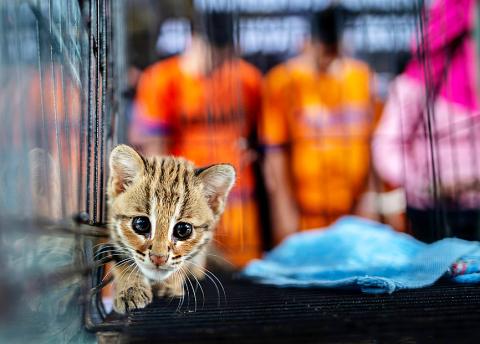Indonesian authorities on Wednesday said that they had seized five komodo dragons and dozens of other animals being sold on Facebook, as the nation clamps down on the illegal wildlife trade.
The vast Southeast Asian archipelago’s dense tropical rainforests boast some of the highest levels of biodiversity in the world, and it has for years been a key source and transit point for animal trafficking.
Five smugglers, identified only by their initials, were arrested in Semarang and Surabaya on Java island for allegedly trafficking the komodos — the world’s biggest lizard — along with bearcats, cockatoos and cassowary birds.

Photo: AFP
“The suspect V.S. sold the komodos online through Facebook,” East Java police spokesman Frans Barung Mangera said in a statement.
The dragons, which can only be found in their natural habitat on a cluster of islands in eastern Indonesia, were sold for between 15 and 20 million rupiah (US$1,000 and US$1,400), Mangera said.
In a separate case, three other people were arrested in East Java over the alleged online sale of otters, leopard cats and pangolin, Mangera said.
If convicted, the smugglers could face up to five years in prison and a 100 million rupiah fine.
The haul of komodo dragons comes just a day after authorities seized more than 5,000 endangered pig-nosed turtles from smugglers in Indonesia’s easternmost province, Papua.
The pig-nosed turtle — which has a distinctive snout-like nose and webbed feet — is only found in Australia and New Guinea, an island shared between Papua New Guinea and Indonesia, and is protected under Indonesian conservation laws.
Indonesia’s illegal trade in wildlife along with habitat loss has driven numerous endangered species, from the Sumatran elephant to the orangutan, to the brink of extinction.
Authorities in Bali last week arrested a Russian tourist who attempted to smuggle a drugged orangutan out of Indonesia in his suitcase to keep as a pet.

POLITICAL PRISONERS VS DEPORTEES: Venezuela’s prosecutor’s office slammed the call by El Salvador’s leader, accusing him of crimes against humanity Salvadoran President Nayib Bukele on Sunday proposed carrying out a prisoner swap with Venezuela, suggesting he would exchange Venezuelan deportees from the US his government has kept imprisoned for what he called “political prisoners” in Venezuela. In a post on X, directed at Venezuelan President Nicolas Maduro, Bukele listed off a number of family members of high-level opposition figures in Venezuela, journalists and activists detained during the South American government’s electoral crackdown last year. “The only reason they are imprisoned is for having opposed you and your electoral fraud,” he wrote to Maduro. “However, I want to propose a humanitarian agreement that

ECONOMIC WORRIES: The ruling PAP faces voters amid concerns that the city-state faces the possibility of a recession and job losses amid Washington’s tariffs Singapore yesterday finalized contestants for its general election on Saturday next week, with the ruling People’s Action Party (PAP) fielding 32 new candidates in the biggest refresh of the party that has ruled the city-state since independence in 1965. The move follows a pledge by Singaporean Prime Minister Lawrence Wong (黃循財), who took office last year and assumed the PAP leadership, to “bring in new blood, new ideas and new energy” to steer the country of 6 million people. His latest shake-up beats that of predecessors Lee Hsien Loong (李顯龍) and Goh Chok Tong (吳作棟), who replaced 24 and 11 politicians respectively

Archeologists in Peru on Thursday said they found the 5,000-year-old remains of a noblewoman at the sacred city of Caral, revealing the important role played by women in the oldest center of civilization in the Americas. “What has been discovered corresponds to a woman who apparently had elevated status, an elite woman,” archeologist David Palomino said. The mummy was found in Aspero, a sacred site within the city of Caral that was a garbage dump for more than 30 years until becoming an archeological site in the 1990s. Palomino said the carefully preserved remains, dating to 3,000BC, contained skin, part of the

Russian hackers last year targeted a Dutch public facility in the first such an attack on the lowlands country’s infrastructure, its military intelligence services said on Monday. The Netherlands remained an “interesting target country” for Moscow due to its ongoing support for Ukraine, its Hague-based international organizations, high-tech industries and harbors such as Rotterdam, the Dutch Military Intelligence and Security Service (MIVD) said in its yearly report. Last year, the MIVD “saw a Russian hacker group carry out a cyberattack against the digital control system of a public facility in the Netherlands,” MIVD Director Vice Admiral Peter Reesink said in the 52-page